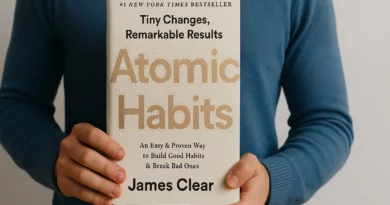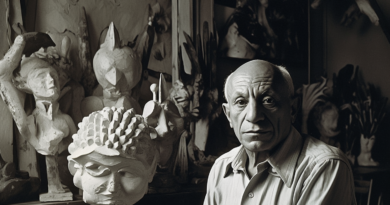Video | Programming new habits
Photo by Benjamin Davies on Unsplash
| Audio | |
|---|---|
Normal | Slow |
| English Transcript | Tradução |
| People wake up in the morning, they begin to think about their problems. | Tão logo as pessoas acordam de manhã, elas começam a pensar em seus problemas. |
| Those problems are circuits, memories in the brain. | Esses problemas são circuitos, memórias no cérebro. |
| Each one of those memories are connected to people and things at certain times and places. | Cada uma dessas memórias está conectada a pessoas e coisas em determinados momentos e lugares. |
| And if the brain is a record of the past, the moment they start their day, they're already thinking in the past. | E se o cérebro é um registro do passado, no momento em que elas começam o dia, elas já estão pensando no passado. |
| Each one of those memories has an emotion. | Cada uma dessas memórias tem uma emoção. |
| Emotions are the end product of past experiences, so the moment they recall those memories of their problems, they all of a sudden feel unhappy, they feel sad, they feel pain. | As emoções são o produto final de experiências passadas, então, no momento em que se lembram dessas memórias de seus problemas, de repente se sentem infelizes, tristes, sentem dor. |
| Now, how you think and how you feel creates your state of being, so the person's entire state of being when they start their day is in the past. | Agora, como você pensa e como você se sente cria seu estado de ser, então todo o estado de ser da pessoa quando ela começa o dia está no passado. |
| So what does that mean? | Então, o que isso significa? |
| The familiar past will sooner or later be predictable future. | O passado familiar mais cedo ou mais tarde será um futuro previsível. |
| If you believe that your thoughts have something to do with your destiny, and you can't think greater than how you feel, our feelings have become the means of thinking. | Se você acredita que seus pensamentos têm algo a ver com seu destino, e você não pode pensar mais do que sente, nossos sentimentos se tornaram o meio de pensar. |
| By very definition of emotions, you are thinking in the past. | Pela própria definição de emoções, você está pensando no passado. |
| And for the most part, you're going to keep creating the same life. | E, na maioria das vezes, você continuará criando a mesma vida. |
| So then people grab their cell phone, they check their whatsapp, they check their texts, they check their emails, they check Facebook, they take a picture of their feet, they post it on Facebook, they tweet something, they do Instagram, they check the news. | Então as pessoas pegam o celular, checam o whatsapp, checam as mensagens, checam os e-mails, checam o Facebook, tiram foto dos pés, postam no Facebook, tweetam alguma coisa, fazem Instagram, conferem as novidades. |
| And now they feel really connected to everything that's known in their life. | E agora elas se sentem realmente conectados a tudo que é conhecido em suas vidas. |
| And then they go through a series of routine behaviors. | E então elas passam por uma série de comportamentos rotineiros. |
| They get out of bed on the same side, and go to the toilet. | Elas saem da cama do mesmo lado e vão ao banheiro. |
| They got a cup of coffee, they take a shower, they get dressed, they drive to work the same way. | Elas tomam uma xícara de café, tomam banho, se vestem, dirigem para o trabalho da mesma maneira. |
| They do the same things, they see the same people. | Elas fazem as mesmas coisas, vêem as mesmas pessoas. |
| That push the same emotional buttons and that becomes the routine and it becomes like a program. | Isso aperta os mesmos botões emocionais e isso se torna a rotina e se torna como um programa. |
| So now they've lost their free will to a program and there's no unseen hand doing it to them. | Então agora elas perderam seu livre arbítrio para um programa e não há mão invisível fazendo isso com elas. |
| So when it comes time to change, the redundancy of that cycle becomes a subconscious program. | Então, quando chega a hora de mudar, a redundância desse ciclo se torna um programa subconsciente. |
| Now, 95% of who we are by the time we're thirty-five years old, is a memorized set of behaviors, emotional reactions, unconscious habits, hardwired attitudes, beliefs and perceptions that function like a computer program. | Agora, 95% de quem somos aos 35 anos é um conjunto memorizado de comportamentos, reações emocionais, hábitos inconscientes, atitudes, crenças e percepções programadas que funcionam como um programa de computador. |
| So then a person can say with their five percent of their conscious mind: "I want to be healthy, I want to be happy, I want to be free", but the body's on a whole different program. | Então, uma pessoa pode dizer com os cinco por cento de sua mente consciente: "Eu quero ser saudável, eu quero ser feliz, eu quero ser livre", mas o corpo está em um programa totalmente diferente. |
| So then how do you begin to make those changes? | Então, como você começa a fazer essas mudanças? |
| Well, you have to get beyond the analytical mind, because what separates the conscious mind from the subconscious mind is the analytical mind. | Bem, você tem que ir além da mente analítica, porque o que separa a mente consciente da mente subconsciente é a mente analítica. |
| And that's where meditation comes in, because you can teach people through practice how to change their brainwaves, slow them down, and when they do that properly, they do enter the operating system where they can begin to make some really important changes. | E é aí que entra a meditação, porque você pode ensinar as pessoas através da prática como mudar suas ondas cerebrais, desacelerá-las, e quando elas fazem isso corretamente, elas entram no sistema operacional onde podem começar a fazer algumas mudanças realmente importantes. |
| The stronger the emotional reaction you have to some experience in their life the higher the emotional quotient, the more you pay attention to the cause. | Quanto mais forte a reação emocional que você tem a alguma experiência em sua vida, quanto maior o quociente emocional, mais você presta atenção à causa. |
| The moment the brain puts all of its attention on the cause, it takes a snapshot. | No momento em que o cérebro coloca toda a sua atenção na causa, ele tira uma fotografia. |
| That's called the memory. | Isso se chama memória. |
| So long-term memory is all created from very highly emotional experiences. | Assim, a memória de longo prazo é toda criada a partir de experiências altamente emocionais. |
| What happens then is that people think neurologically within the circuitry of that experience. | O que acontece então é que as pessoas pensam neurologicamente dentro do circuito dessa experiência. |
| And they feel chemically within the boundaries of those emotions. | E elas se sentem quimicamente dentro dos limites dessas emoções. |
| And so when you have an emotional reaction to someone or something, most people think that they can't control their emotional reaction. | E então, quando você tem uma reação emocional a alguém ou alguma coisa, a maioria das pessoas pensa que não consegue controlar sua reação emocional. |
| Well, it turns out that if you allow that emotional reaction, it's called a "refractory period" to last for hours or days, that's called "the mood". | Bem, acontece que se você permitir essa reação emocional, é chamado de "período refratário" para durar horas ou dias, isso é chamado de "humor". |
| I say to someone: "Hey, what's up?" | Eu digo a alguém: "Ei, e aí?" |
| "I'm in a mood." | "Estou de mau humor." |
| "Why are you in a mood?" | "Por que você está de mau humor?" |
| "I had this thing happen to me five days ago, and I'm having one long emotional reaction." | "Isso aconteceu comigo cinco dias atrás, e estou tendo uma longa reação emocional." |
| If you keep that same emotional reaction going on for weeks or months, that's called temperament. | Se você mantiver essa mesma reação emocional por semanas ou meses, isso se chama temperamento. |
| "Why is he so bitter?" | "Por que ele é tão amargo?" |
| "I don't know, let's ask him why is he so bitter?" | "Eu não sei, vamos perguntar a ele por que ele é tão amargo?" |
| "Why are you bitter?" | "Por que você é amargo?" |
| "Well, I had this thing happened to me nine months ago." | "Bem, isso aconteceu comigo nove meses atrás." |
| And if you keep that same emotional reaction going on for years on end, that's called a personality trait. | E se você mantiver essa mesma reação emocional por anos a fio, isso é chamado de traço de personalidade. |
| People when they have an event, what they do is, they keep recalling the event, because the the emotions of stress hormones, the survival emotions, are saying: "Pay attention to what happened because you want to be prepared if it happens again." | As pessoas quando têm um evento, o que elas fazem é ficar relembrando o evento, porque as emoções dos hormônios do estresse, as emoções de sobrevivência, estão dizendo: "Preste atenção no que aconteceu, porque você quer estar preparado se acontecer novamente. " |
| Turns out most people spend 70% of their life living in survival and living in stress. | Acontece que a maioria das pessoas passa 70% de sua vida vivendo em sobrevivência e vivendo em estresse. |
| So, they are always anticipating the worst-case scenario, based on a past experience and literally, out of the infinite potentials in the quantum field, they're selecting the worst possible outcome and they're beginning to emotionally embrace it with fear and they are conditioning their body into a state of fear. | Então, elas estão sempre antecipando o pior cenário, com base em uma experiência passada e, literalmente, dos infinitos potenciais no campo quântico, elas estão selecionando o pior resultado possível e estão começando a abraçá-lo emocionalmente com medo e elas estão condicionando seu corpo a um estado de medo. |
| Do that enough times, your body has a panic attack without you, you can't even predict it, because it's programmed subconsciously. | Faça isso várias vezes, seu corpo tem um ataque de pânico sem você, você nem consegue prever, porque está programado subconscientemente. |
| You say to the person: "Why are you this way?" | Você diz à pessoa: "Por que você está assim?" |
| And they'll say: "I am this way because of this event that happened to me 15 or 20 years ago." | E elas vão dizer: "Eu estou assim por causa desse evento que aconteceu comigo 15 ou 20 anos atrás." |
| And what that means from a biological standpoint, is that they haven't been able to change since that event. | E o que isso significa do ponto de vista biológico, é que elas não foram capazes de mudar desde aquele evento. |
| So then the emotions from the experience tend to give the body and the brain a rush of energy. | Então, as emoções da experiência tendem a dar ao corpo e ao cérebro uma onda de energia. |
| So people become addicted to the rush of those emotions and they use the problems and conditions in their life to reaffirm their limitation, so at least they can feel something. | Assim, as pessoas se tornam viciadas na pressa dessas emoções e usam os problemas e as condições de sua vida para reafirmar sua limitação, para que pelo menos possam sentir alguma coisa. |
| So now, when it comes time to change, you say to the person: "Why are you this way?" | Então agora, quando chega a hora de mudar, você diz para a pessoa: "Por que você está assim?" |
| Well every time they recall the event they're producing the same chemistry in their brain and body, as if the event is occurring, firing and wiring the same circuits and sending the same emotional signature to the body. | Bem, toda vez que elas se lembram do evento, estão produzindo a mesma química em seu cérebro e corpo, como se o evento estivesse ocorrendo, disparando e conectando os mesmos circuitos e enviando a mesma assinatura emocional para o corpo. |
| What's the relevance behind that? | Qual a relevância por trás disso? |
| Well, your body is the unconscious mind, it doesn't know the difference between the experience that's creating the emotion and the emotion that you're creating by thought alone, so the body is believing, it's living in the same past experience 24 hours a day, seven days a week, 365 days a year. | Bem, seu corpo é a mente inconsciente, ele não sabe a diferença entre a experiência que está criando a emoção e a emoção que você está criando apenas pelo pensamento, então o corpo está acreditando, está vivendo na mesma experiência passada 24 horas por dia, sete dias por semana, 365 dias por ano. |
| And so then, when those emotions influence certain thoughts, and they do, and then those thoughts create the same emotions, and those same emotions influence the same thoughts. | E então, quando essas emoções influenciam certos pensamentos, e elas o fazem, e então esses pensamentos criam as mesmas emoções, e essas mesmas emoções influenciam os mesmos pensamentos. |
| Now, the entire person's state of being is in the past. | Agora, todo o estado de ser da pessoa está no passado. |
| The hardest part about change is not making the same choice as you did the day before, period. | A parte mais difícil da mudança não é fazer a mesma escolha que você fez no dia anterior, ponto final. |
| And the moment you decide to make a different choice, get ready, because it's going to feel uncomfortable when it comes time to change. | E no momento em que você decidir fazer uma escolha diferente, prepare-se, porque vai se sentir desconfortável na hora de mudar. |
| A person steps into that river of change and they make a different choice and all of a sudden, they don't they don't feel the same way, so the body says: "Well, you've been doing this for 35 years, well you're gonna just stop feel suffering and stop feeling guilty and stop feeling shameful and you're not gonna complain or blame or make excuses or feel sorry for yourself." | Uma pessoa entra nesse rio de mudança e faz uma escolha diferente e, de repente, não sente o mesmo, então o corpo diz: "Bem, você faz isso há 35 anos, bem, você vai parar de sofrer e parar de se sentir culpado e de se sentir envergonhado e não vai reclamar ou culpar ou dar desculpas ou sentir pena de si mesmo." |
| Well, the body's in the unknown so the body says: "I want to return back to familiar territory", so the body starts influencing the mind. | Bem, o corpo está no desconhecido, então o corpo diz: "Eu quero voltar ao território familiar", então o corpo começa a influenciar a mente. |
| Then it says: "Start tomorrow". | Então diz: "Comece amanhã". |
| "They're too much like your mother, you'll never change, this isn't gonna work for you, this doesn't feel right." | "Eles são muito parecidos com sua mãe, você nunca vai mudar, isso não vai funcionar para você, isso não parece certo." |
| And so, if you respond to that thought as if it's true, that same thought will lead to the same choice, which will lead to the same behavior, which will create the same experience, which produces the same emotion. | E assim, se você responder a esse pensamento como se fosse verdade, esse mesmo pensamento levará à mesma escolha, que levará ao mesmo comportamento, que criará a mesma experiência, que produzirá a mesma emoção. |
| What thoughts do you want to fire and wire in your brain? | Que pensamentos você quer disparar e conectar em seu cérebro? |
| What behaviors do you want to demonstrate in one day? | Que comportamentos você quer demonstrar em um dia? |
| The act of rehearsing mentally, closing your eyes, and rehearsing the action, if you're truly present, the brain does not know the difference between what you're imagining and what you're experiencing in a 3d world. | O ato de ensaiar mentalmente, fechar os olhos e ensaiar a ação, se você estiver realmente presente, o cérebro não saberá a diferença entre o que você está imaginando e o que você está vivenciando em um mundo 3D. |
| So then you begin to install the neurological hardware in your brain to look like the event has already occurred. | Então você começa a instalar o hardware neurológico em seu cérebro para parecer que o evento já ocorreu. |
| Now your brain is no longer a record of the past, now it's a map to the future and if you keep doing it, priming it that way, the hardware becomes a software program and who knows, you just may start acting like a happy person. | Agora seu cérebro não é mais um registro do passado, ele é agora um mapa para o futuro e se você continuar fazendo isso, preparando-o dessa maneira, o hardware se torna um programa de software e quem sabe, você pode começar a agir como uma pessoa feliz . |
| The moment you start feeling abundant and worthy, you are generating wealth, the moment you're empowered and feel it, you're beginning to step towards your success. | No momento em que você começa a se sentir abundante e digno, você está gerando riqueza, no momento em que você é fortalecido e sente isso, você está começando a caminhar em direção ao seu sucesso. |
| The moment you start feeling whole, your healing begins. | No momento em que você começa a se sentir completo, sua cura começa. |
| And when you love yourself and you love all of life, you'll create an equal and now you're causing an effect. | E quando você ama a si mesmo e ama toda a vida, você cria um igual e agora está causando um efeito. |
| And I think that's the difference between living as a victim in your world saying: "I am this way because of this person or that thing or this experience. They made me think and feel this way". | E acho que essa é a diferença entre viver como vítima em seu mundo dizendo: "Eu sou assim por causa dessa pessoa ou daquela coisa ou dessa experiência. Eles me fizeram pensar e me sentir assim". |
| When you switch that around, you become a creator of your world, and you start saying: "My thinking and my feeling is changing an outcome in my life and now that's a whole different game", and we start believing more that we're creators of reality. | Quando você muda isso, você se torna um criador do seu mundo e começa a dizer: "Meu pensamento e meu sentimento estão mudando um resultado na minha vida e agora esse é um jogo totalmente diferente", e começamos a acreditar mais que estamos criando nossa realidade. |
| If you're not being defined by a vision of the future, then you're left with the old memories of the past and you will be predictable in your life. | Se você não estiver sendo definido por uma visão do futuro, ficará com as velhas memórias do passado e será previsível em sua vida. |
| And if you wake up in the morning and you're not being defined by a vision of the future as you see the same people and you go to the same places and you do the exact same thing at the exact same time it's no longer that your personality is creating your personal reality, because your personal reality is affecting or creating your personality. | E se você acordar de manhã e não estiver sendo definido por uma visão do futuro, quando você vê as mesmas pessoas e vai aos mesmos lugares e faz exatamente a mesma coisa na mesma hora, não é que sua personalidade esteja criando sua realidade pessoal, e sim que a sua realidade pessoal está afetando ou criando sua personalidade. |
| Your environment is really controlling how you think and feel unconsciously, because every person, every thing, every place of the experience, has a neurological network in your brain. | Seu ambiente está realmente controlando como você pensa e sente inconscientemente, porque cada pessoa, cada coisa, cada lugar da experiência, tem uma rede neurológica em seu cérebro. |
| Every experience that you have with every person produces an emotion, so to change them, is to be greater than your environment, to be greater than the conditions in your world, and the environment is that seductive. | Cada experiência que você tem com cada pessoa produz uma emoção, então mudá-la é ser maior do que o seu ambiente, ser maior do que as condições do seu mundo, e o ambiente é tão sedutor. |
| "If you want a new outcome, you will have to break the habit of being yourself, and reinvent a new self." | "Se você quer um novo resultado, terá que quebrar o hábito de ser você mesmo e reinventar um novo eu." |
Contagem de palavras
A tabela abaixo exibe as palavras encontradas neste vídeo bem como o número de vezes em que aparecem.
Veja também: Para que serve esta tabela?
| Freq. | Palavra | Freq. | Palavra | Freq. | Palavra |
|---|---|---|---|---|---|
| 119 | the | 67 | and | 55 | to |
| 50 | you | 44 | they | 43 | a |
| 42 | of | 31 | that | 28 | in |
| 26 | same | 25 | so | 23 | your |
| 22 | is | 21 | their | 16 | it |
| 16 | feel | 14 | if | 13 | you're |
| 13 | this | 13 | are | 12 | emotional |
| 12 | do | 11 | then | 11 | people |
| 11 | past | 11 | or | 11 | I |
| 10 | when | 10 | what | 10 | those |
| 10 | now | 10 | experience | 10 | emotions |
| 10 | brain | 10 | body | 10 | because |
| 9 | that's | 9 | change | 8 | well |
| 8 | way | 8 | want | 8 | think |
| 8 | start | 8 | person | 8 | on |
| 8 | life | 8 | have | 8 | be |
| 7 | will | 7 | reaction | 7 | moment |
| 7 | mind | 7 | it's | 7 | for |
| 7 | event | 7 | an | 6 | why |
| 6 | time | 6 | program | 6 | how |
| 6 | every | 6 | being | 5 | with |
| 5 | thoughts | 5 | thing | 5 | they're |
| 5 | say | 5 | not | 5 | memories |
| 5 | make | 5 | like | 5 | keep |
| 5 | feeling | 5 | emotion | 5 | day |
| 5 | creating | 5 | check | 5 | called |
| 5 | by | 5 | as | 5 | all |
| 4 | years | 4 | world | 4 | thinking |
| 4 | state | 4 | something | 4 | problems |
| 4 | out | 4 | one | 4 | me |
| 4 | living | 4 | has | 4 | going |
| 4 | get | 4 | future | 4 | from |
| 4 | different | 4 | days | 4 | comes |
| 4 | choice | 4 | can | 4 | begin |
| 4 | becomes | 3 | yourself | 3 | whole |
| 3 | which | 3 | up | 3 | thought |
| 3 | them | 3 | than | 3 | stop |
| 3 | says | 3 | saying | 3 | really |
| 3 | reality | 3 | personality | 3 | outcome |
| 3 | no | 3 | my | 3 | most |
| 3 | mood | 3 | know | 3 | happened |
| 3 | greater | 3 | gonna | 3 | go |
| 3 | five | 3 | environment | 3 | don't |
| 3 | doing | 3 | difference | 3 | create |
| 3 | can't | 3 | bitter | 3 | between |
| 3 | behaviors | 3 | become | 3 | attention |
| 3 | at | 3 | ago | 2 | you'll |
| 2 | worst | 2 | work | 2 | within |
| 2 | who | 2 | where | 2 | what's |
| 2 | we're | 2 | we | 2 | wake |
| 2 | vision | 2 | very | 2 | unconscious |
| 2 | turns | 2 | times | 2 | through |
| 2 | things | 2 | take | 2 | survival |
| 2 | sudden | 2 | subconscious | 2 | stress |
| 2 | someone | 2 | some | 2 | see |
| 2 | rush | 2 | routine | 2 | rehearsing |
| 2 | record | 2 | recall | 2 | produces |
| 2 | predictable | 2 | places | 2 | person's |
| 2 | personal | 2 | period | 2 | pay |
| 2 | part | 2 | old | 2 | new |
| 2 | neurological | 2 | morning | 2 | more |
| 2 | months | 2 | memory | 2 | means |
| 2 | love | 2 | longer | 2 | long |
| 2 | lead | 2 | just | 2 | into |
| 2 | influence | 2 | I'm | 2 | hours |
| 2 | he | 2 | hardware | 2 | happy |
| 2 | happens | 2 | had | 2 | free |
| 2 | fear | 2 | familiar | 2 | |
| 2 | experiences | 2 | exact | 2 | entire |
| 2 | end | 2 | each | 2 | doesn't |
| 2 | does | 2 | defined | 2 | conscious |
| 2 | connected | 2 | conditions | 2 | circuits |
| 2 | changes | 2 | certain | 2 | cause |
| 2 | body's | 2 | believing | 2 | beginning |
| 2 | been | 2 | analytical | 2 | am |
| 2 | already | 2 | about | 1 | you've |
| 1 | year | 1 | worthy | 1 | without |
| 1 | wiring | 1 | wire | 1 | |
| 1 | weeks | 1 | week | 1 | wealth |
| 1 | victim | 1 | use | 1 | unseen |
| 1 | unknown | 1 | unhappy | 1 | unconsciously |
| 1 | uncomfortable | 1 | tweet | 1 | truly |
| 1 | true | 1 | trait | 1 | towards |
| 1 | too | 1 | tomorrow | 1 | toilet |
| 1 | thirty | 1 | they've | 1 | they'll |
| 1 | there's | 1 | texts | 1 | territory |
| 1 | term | 1 | tend | 1 | temperament |
| 1 | teach | 1 | takes | 1 | system |
| 1 | switch | 1 | suffering | 1 | success |
| 1 | subconsciously | 1 | stronger | 1 | steps |
| 1 | step | 1 | starts | 1 | standpoint |
| 1 | spend | 1 | sorry | 1 | sooner |
| 1 | software | 1 | snapshot | 1 | slow |
| 1 | since | 1 | signature | 1 | side |
| 1 | shower | 1 | shameful | 1 | seven |
| 1 | set | 1 | series | 1 | separates |
| 1 | sending | 1 | self | 1 | selecting |
| 1 | seductive | 1 | scenario | 1 | sad |
| 1 | river | 1 | right | 1 | return |
| 1 | respond | 1 | relevance | 1 | reinvent |
| 1 | refractory | 1 | redundancy | 1 | recalling |
| 1 | reaffirm | 1 | ready | 1 | reactions |
| 1 | quotient | 1 | quantum | 1 | puts |
| 1 | push | 1 | properly | 1 | programmed |
| 1 | product | 1 | producing | 1 | priming |
| 1 | present | 1 | prepared | 1 | predict |
| 1 | practice | 1 | potentials | 1 | post |
| 1 | possible | 1 | place | 1 | picture |
| 1 | phone | 1 | perceptions | 1 | percent |
| 1 | panic | 1 | pain | 1 | our |
| 1 | operating | 1 | occurring | 1 | occurred |
| 1 | nine | 1 | news | 1 | never |
| 1 | neurologically | 1 | network | 1 | much |
| 1 | mother | 1 | mentally | 1 | memorized |
| 1 | meditation | 1 | mean | 1 | may |
| 1 | map | 1 | making | 1 | made |
| 1 | lost | 1 | look | 1 | literally |
| 1 | limitation | 1 | let's | 1 | left |
| 1 | least | 1 | later | 1 | last |
| 1 | knows | 1 | known | 1 | its |
| 1 | isn't | 1 | install | 1 | |
| 1 | influencing | 1 | infinite | 1 | important |
| 1 | imagining | 1 | hormones | 1 | him |
| 1 | highly | 1 | higher | 1 | hey |
| 1 | healthy | 1 | healing | 1 | having |
| 1 | haven't | 1 | hardwired | 1 | hardest |
| 1 | happen | 1 | hand | 1 | habits |
| 1 | habit | 1 | guilty | 1 | grab |
| 1 | got | 1 | give | 1 | generating |
| 1 | game | 1 | function | 1 | firing |
| 1 | fire | 1 | field | 1 | feet |
| 1 | feelings | 1 | eyes | 1 | experiencing |
| 1 | excuses | 1 | everything | 1 | even |
| 1 | equal | 1 | enter | 1 | enough |
| 1 | energy | 1 | empowered | 1 | emotionally |
| 1 | embrace | 1 | emails | 1 | effect |
| 1 | drive | 1 | dressed | 1 | down |
| 1 | did | 1 | destiny | 1 | demonstrate |
| 1 | definition | 1 | decide | 1 | d |
| 1 | cycle | 1 | cup | 1 | creators |
| 1 | creator | 1 | creates | 1 | created |
| 1 | controlling | 1 | control | 1 | conditioning |
| 1 | computer | 1 | complain | 1 | coffee |
| 1 | closing | 1 | circuitry | 1 | chemistry |
| 1 | chemically | 1 | changing | 1 | cell |
| 1 | causing | 1 | case | 1 | buttons |
| 1 | but | 1 | break | 1 | brainwaves |
| 1 | boundaries | 1 | blame | 1 | biological |
| 1 | beyond | 1 | believe | 1 | beliefs |
| 1 | behind | 1 | behavior | 1 | begins |
| 1 | before | 1 | bed | 1 | based |
| 1 | back | 1 | attitudes | 1 | attack |
| 1 | ask | 1 | around | 1 | anticipating |
| 1 | always | 1 | alone | 1 | allow |
| 1 | again | 1 | affecting | 1 | addicted |
| 1 | action | 1 | acting | 1 | act |
| 1 | abundant | 1 | able |









